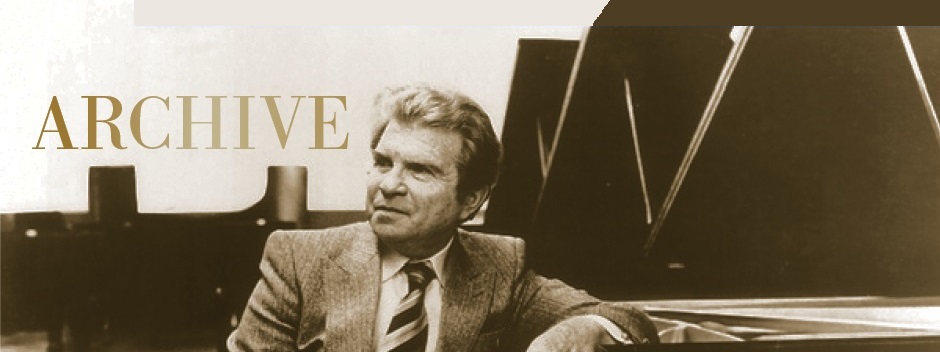The competition was planned as an important event with its aim being to show the country, and the world, the successes of the Soviet system in the Arts. The best young musicians of the USSR were preparing to take part in the competition including those who had recently gained the world’s attention in the Second International Chopin Piano Competition in Poland.
At this point Gilels was not yet known in Moscow and Berta Reingbald decided to take her student for a consultation with Heinrich Neuhaus, whom she deeply respected as a musician. Neuhaus had already acquired a reputation as a prominent piano professor and in the autumn of 1932, half a year before the competition, the sixteen year old Gilels came to Moscow and played to him. Neuhaus however, did not fully understand Gilels’ gift: he heard only the brilliant virtuosic facility (which being a sensitive musician gave Neuhaus an element of apprehension), and he did not notice that which had astounded Borovsky and Rubinstein – a profound content that took its form not from elaborate Romantic means, but was endowed with a simplicity that was well beyond the years of such a young musician. In this way two points of view on Gilels’ pianism were formed – one found in him a unique Artist who had already in his youth attained the highest level of simplicity, and the other found in him a bold Soviet pianist with amazing facility and interpretations based on the ideals of ‘Soviet-objectivism.’
The competition however showed that Neuhaus was mistaken. Gilels’ playing created a sensation – when he finished his programme the auditorium rose up in tumultuous ovation and even the jury stood to applaud. The question of first prize was not even discussed: in a unanimous decision Gilels was announced the winner.
What was it that impressed the audience so much in his performance of Rameau, Bach-Godowsky’s Fugue, Brahms’ Variations and Fugue on a Theme of Handel, Ravel’s Toccata and Mozart-Liszt-Busoni’s Fantasia on Two Themes from ‘The Marriage of Figaro’? According to the numerous musicians who heard Gilels’ performance (including Dmitri Shostakovich, Yakov Flier, Dmitri Kabalevsky and Lev Barenboim), his playing captivated the listener with its spellbinding sincerity of communication, an unusually warm, full and diverse sound, its springy ‘live’ and pulsating rhythm, phenomenal virtuosity and also clarity, logic, good-taste and noble simplicity. According to many, they had never before heard playing of this calibre: it was a ‘moment of truth’ for pianism, and all those present knew that before them stood a great pianist.
The competition changed Emil’s life – he was suddenly famous throughout the land. His younger sister, Liza, was performing successfully as a violinist, and Josef Stalin himself commented on the remarkably talented siblings. From this point Gilels’ fame in the USSR was tinged by a political shadow that subsequently proved a hindrance to his critical reception.
Following the competition, Gilels embarked on an extensive concert tour around the USSR. His concerts were followed by critiques written by reviewers who, at the time, were fixated on finding a ‘truly Soviet’ interpretative style. Gilels’ playing was always characterized by a heroic intensity, elastic rhythm and humanism. However in his youth this list, understandably, accommodated exaggerated tempos that stemmed from his unbelievable virtuosity, and a certain over-simplification of artistic ideas that derived from his youthful inability to sufficiently communicate a wide enough range of feelings. As a consequence of these qualities he was heralded as the epitome of Soviet style. His playing was characterized in language borrowed from industrial manufacture. This hurt the young pianist who at the time was striving to attain the complete antithesis of these remarks – he wanted to realize the lyrical aspects of his gift.
However, the critics did not stop at ‘the masonry of broad structures’ in their descriptions of Gilels’ playing. By proclaiming Gilels as a young, experimental example of a ‘truly Soviet’ pianism, some of them decided that they had the right to correct and educate him: to watch that he does not falter in this path. At the same time, Gilels was facing a different, more actual problem. The expansive concert tours meant that he could not practise or increase his repertoire: Gilels felt his development as a pianist was being stunted. Weary from these thoughts and the constant nagging of the press, Emil displayed his strong character. He terminated all further engagements and returned to Odessa into the calm environment and security provided by his favourite teacher Reingbald. Gilels even turned down an invitation to transfer to the Moscow Conservatory, deciding instead to finish his course at the Odessa Conservatory. Furthermore, Gilels would subsequently regard Berta Reingbald as his true teacher, mentor and life-long friend.


